Entrepreneurial Ventures: Analysis of Types and Economic Impact
VerifiedAdded on 2021/01/01
|15
|4829
|355
Report
AI Summary
This report on entrepreneurship and small business management begins with an introduction to entrepreneurship, defining key terms and outlining the report's scope. Task 1 delves into the various types of entrepreneurial ventures, including small-scale, large-scale, scalable start-up, and social enterprises, exploring their interrelationships and typologies like serial and female entrepreneurs. Task 2 examines the impact of micro and small businesses (SMEs) on the UK economy, highlighting their role in job creation, income generation, and innovation, particularly in the context of the post-Brexit economic landscape. Task 3 identifies the characteristics, traits, and skills of successful entrepreneurs, as well as the aspects of entrepreneurial personality that influence motivation and mindset. Finally, Task 4 investigates how background and experience can either hinder or foster an entrepreneur's success. The report concludes with a summary of findings and a list of references.
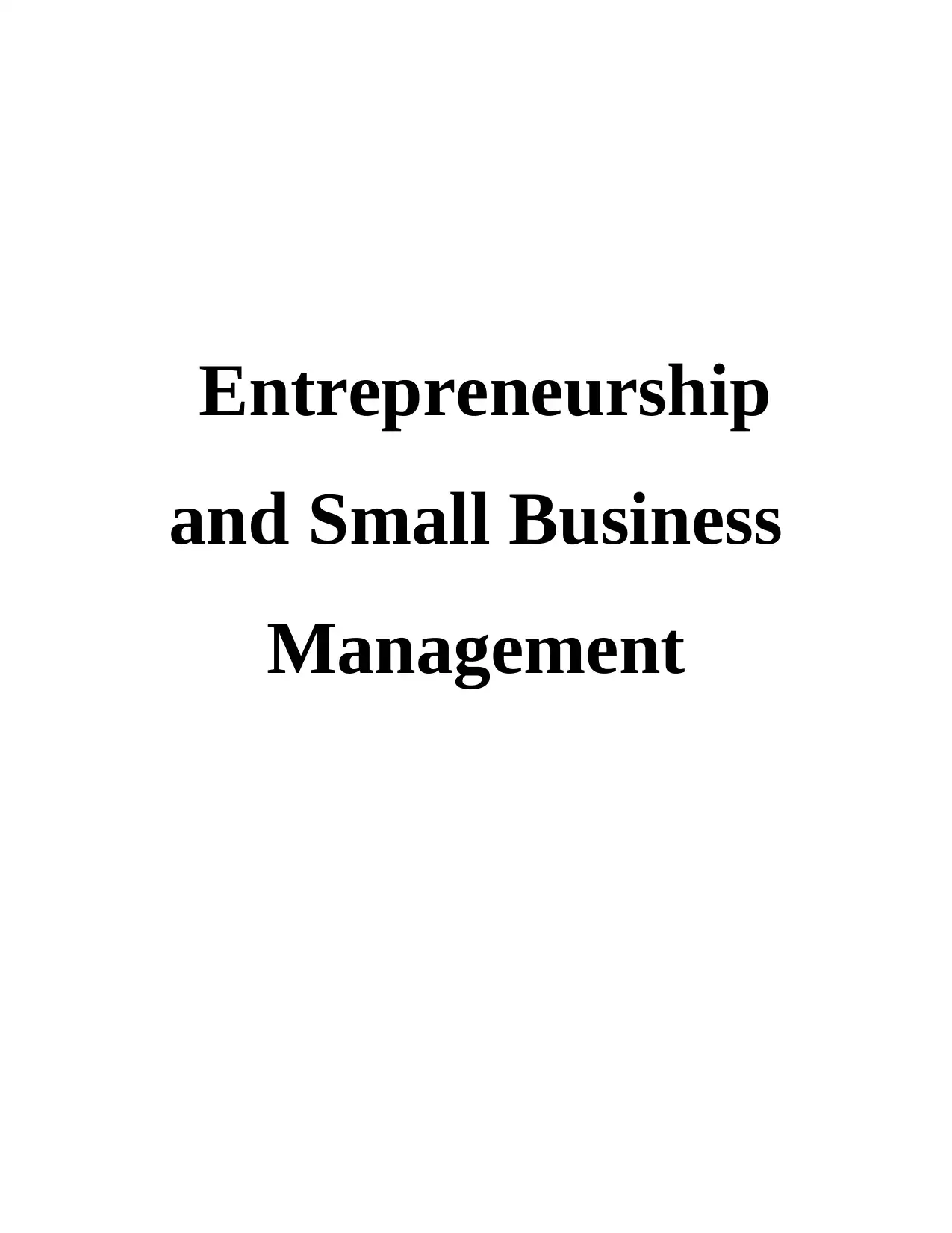
Entrepreneurship
and Small Business
Management
and Small Business
Management
Paraphrase This Document
Need a fresh take? Get an instant paraphrase of this document with our AI Paraphraser
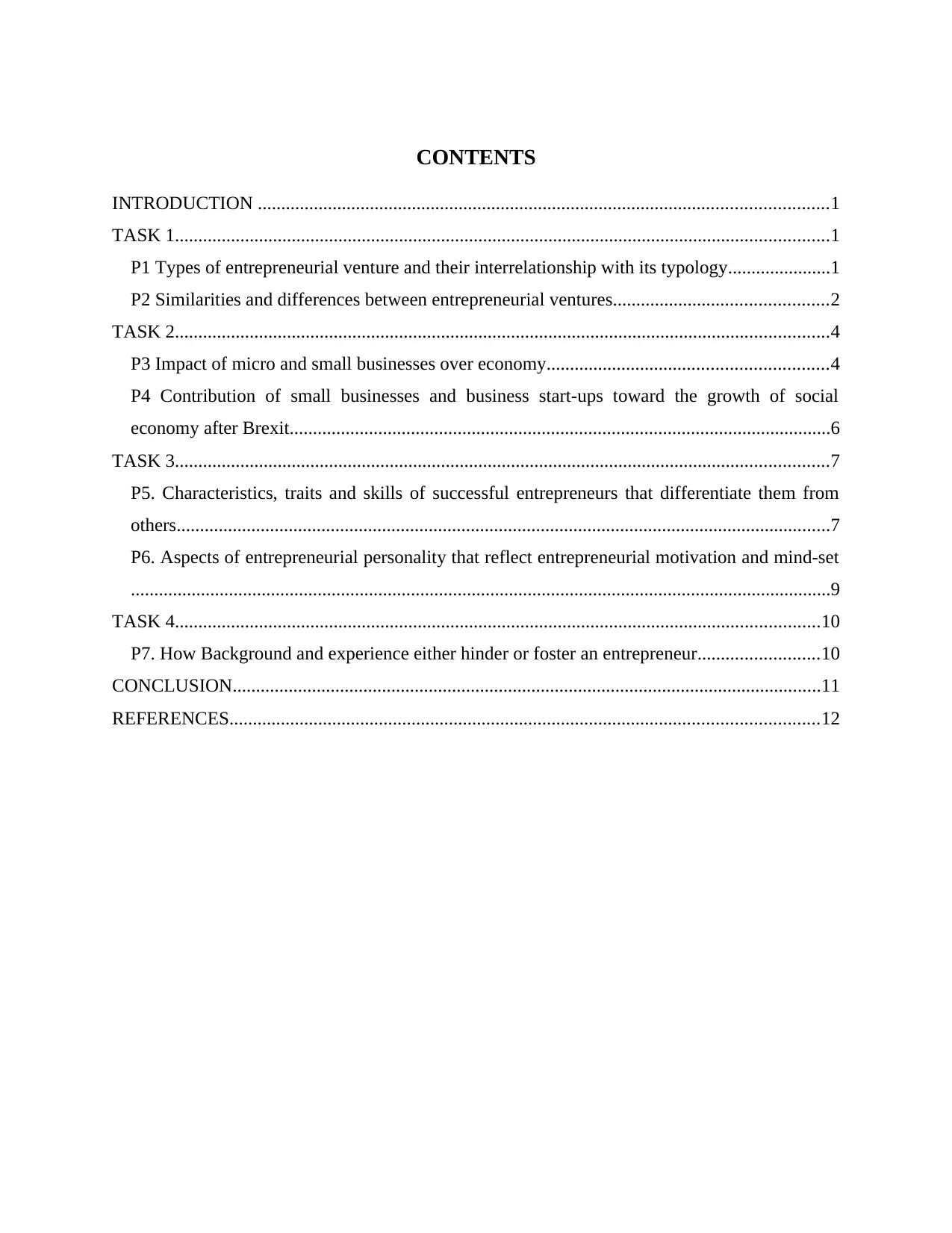
CONTENTS
INTRODUCTION ..........................................................................................................................1
TASK 1............................................................................................................................................1
P1 Types of entrepreneurial venture and their interrelationship with its typology......................1
P2 Similarities and differences between entrepreneurial ventures..............................................2
TASK 2............................................................................................................................................4
P3 Impact of micro and small businesses over economy............................................................4
P4 Contribution of small businesses and business start-ups toward the growth of social
economy after Brexit....................................................................................................................6
TASK 3............................................................................................................................................7
P5. Characteristics, traits and skills of successful entrepreneurs that differentiate them from
others............................................................................................................................................7
P6. Aspects of entrepreneurial personality that reflect entrepreneurial motivation and mind-set
......................................................................................................................................................9
TASK 4..........................................................................................................................................10
P7. How Background and experience either hinder or foster an entrepreneur..........................10
CONCLUSION..............................................................................................................................11
REFERENCES..............................................................................................................................12
INTRODUCTION ..........................................................................................................................1
TASK 1............................................................................................................................................1
P1 Types of entrepreneurial venture and their interrelationship with its typology......................1
P2 Similarities and differences between entrepreneurial ventures..............................................2
TASK 2............................................................................................................................................4
P3 Impact of micro and small businesses over economy............................................................4
P4 Contribution of small businesses and business start-ups toward the growth of social
economy after Brexit....................................................................................................................6
TASK 3............................................................................................................................................7
P5. Characteristics, traits and skills of successful entrepreneurs that differentiate them from
others............................................................................................................................................7
P6. Aspects of entrepreneurial personality that reflect entrepreneurial motivation and mind-set
......................................................................................................................................................9
TASK 4..........................................................................................................................................10
P7. How Background and experience either hinder or foster an entrepreneur..........................10
CONCLUSION..............................................................................................................................11
REFERENCES..............................................................................................................................12
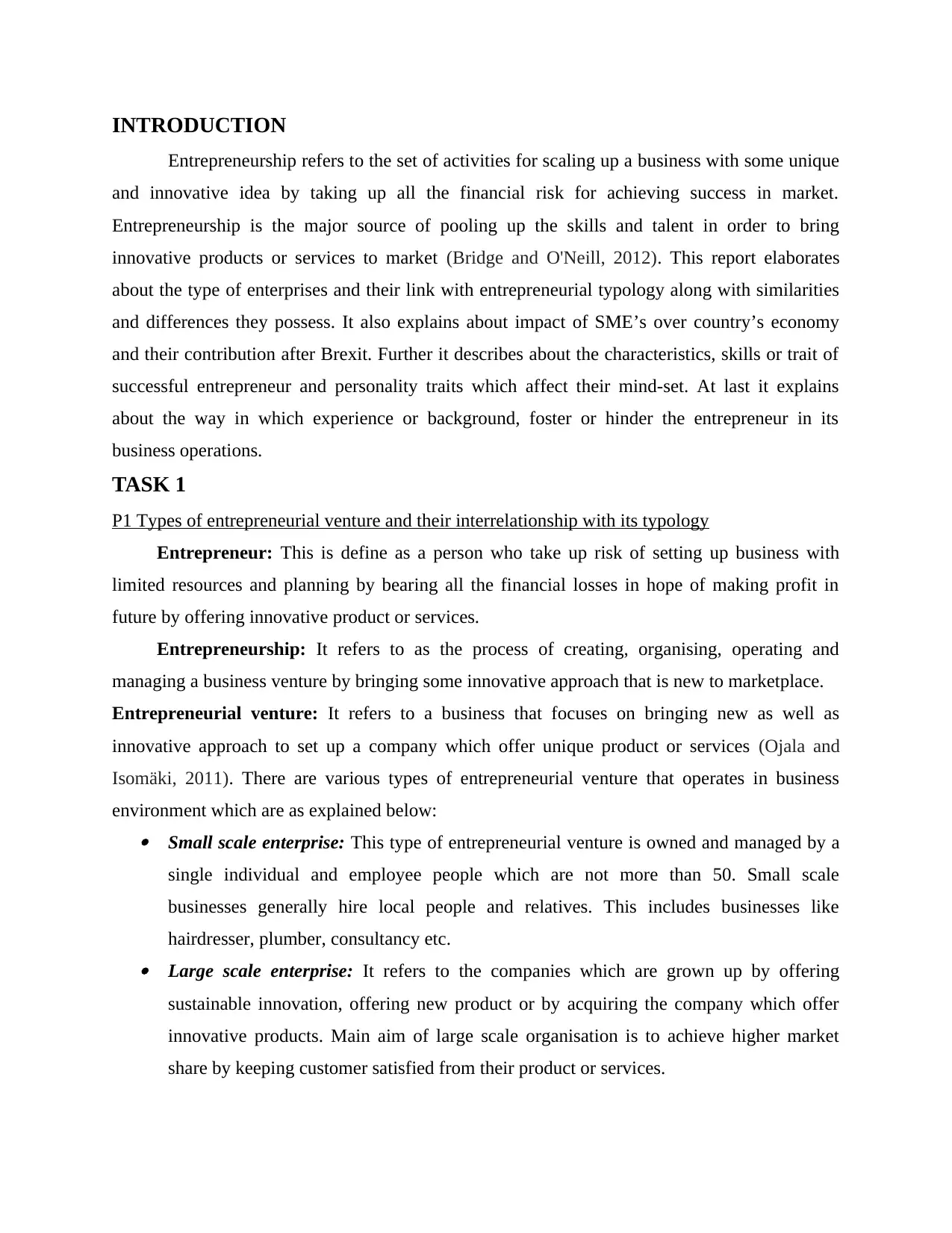
INTRODUCTION
Entrepreneurship refers to the set of activities for scaling up a business with some unique
and innovative idea by taking up all the financial risk for achieving success in market.
Entrepreneurship is the major source of pooling up the skills and talent in order to bring
innovative products or services to market (Bridge and O'Neill, 2012). This report elaborates
about the type of enterprises and their link with entrepreneurial typology along with similarities
and differences they possess. It also explains about impact of SME’s over country’s economy
and their contribution after Brexit. Further it describes about the characteristics, skills or trait of
successful entrepreneur and personality traits which affect their mind-set. At last it explains
about the way in which experience or background, foster or hinder the entrepreneur in its
business operations.
TASK 1
P1 Types of entrepreneurial venture and their interrelationship with its typology
Entrepreneur: This is define as a person who take up risk of setting up business with
limited resources and planning by bearing all the financial losses in hope of making profit in
future by offering innovative product or services.
Entrepreneurship: It refers to as the process of creating, organising, operating and
managing a business venture by bringing some innovative approach that is new to marketplace.
Entrepreneurial venture: It refers to a business that focuses on bringing new as well as
innovative approach to set up a company which offer unique product or services (Ojala and
Isomäki, 2011). There are various types of entrepreneurial venture that operates in business
environment which are as explained below: Small scale enterprise: This type of entrepreneurial venture is owned and managed by a
single individual and employee people which are not more than 50. Small scale
businesses generally hire local people and relatives. This includes businesses like
hairdresser, plumber, consultancy etc. Large scale enterprise: It refers to the companies which are grown up by offering
sustainable innovation, offering new product or by acquiring the company which offer
innovative products. Main aim of large scale organisation is to achieve higher market
share by keeping customer satisfied from their product or services.
Entrepreneurship refers to the set of activities for scaling up a business with some unique
and innovative idea by taking up all the financial risk for achieving success in market.
Entrepreneurship is the major source of pooling up the skills and talent in order to bring
innovative products or services to market (Bridge and O'Neill, 2012). This report elaborates
about the type of enterprises and their link with entrepreneurial typology along with similarities
and differences they possess. It also explains about impact of SME’s over country’s economy
and their contribution after Brexit. Further it describes about the characteristics, skills or trait of
successful entrepreneur and personality traits which affect their mind-set. At last it explains
about the way in which experience or background, foster or hinder the entrepreneur in its
business operations.
TASK 1
P1 Types of entrepreneurial venture and their interrelationship with its typology
Entrepreneur: This is define as a person who take up risk of setting up business with
limited resources and planning by bearing all the financial losses in hope of making profit in
future by offering innovative product or services.
Entrepreneurship: It refers to as the process of creating, organising, operating and
managing a business venture by bringing some innovative approach that is new to marketplace.
Entrepreneurial venture: It refers to a business that focuses on bringing new as well as
innovative approach to set up a company which offer unique product or services (Ojala and
Isomäki, 2011). There are various types of entrepreneurial venture that operates in business
environment which are as explained below: Small scale enterprise: This type of entrepreneurial venture is owned and managed by a
single individual and employee people which are not more than 50. Small scale
businesses generally hire local people and relatives. This includes businesses like
hairdresser, plumber, consultancy etc. Large scale enterprise: It refers to the companies which are grown up by offering
sustainable innovation, offering new product or by acquiring the company which offer
innovative products. Main aim of large scale organisation is to achieve higher market
share by keeping customer satisfied from their product or services.
⊘ This is a preview!⊘
Do you want full access?
Subscribe today to unlock all pages.

Trusted by 1+ million students worldwide
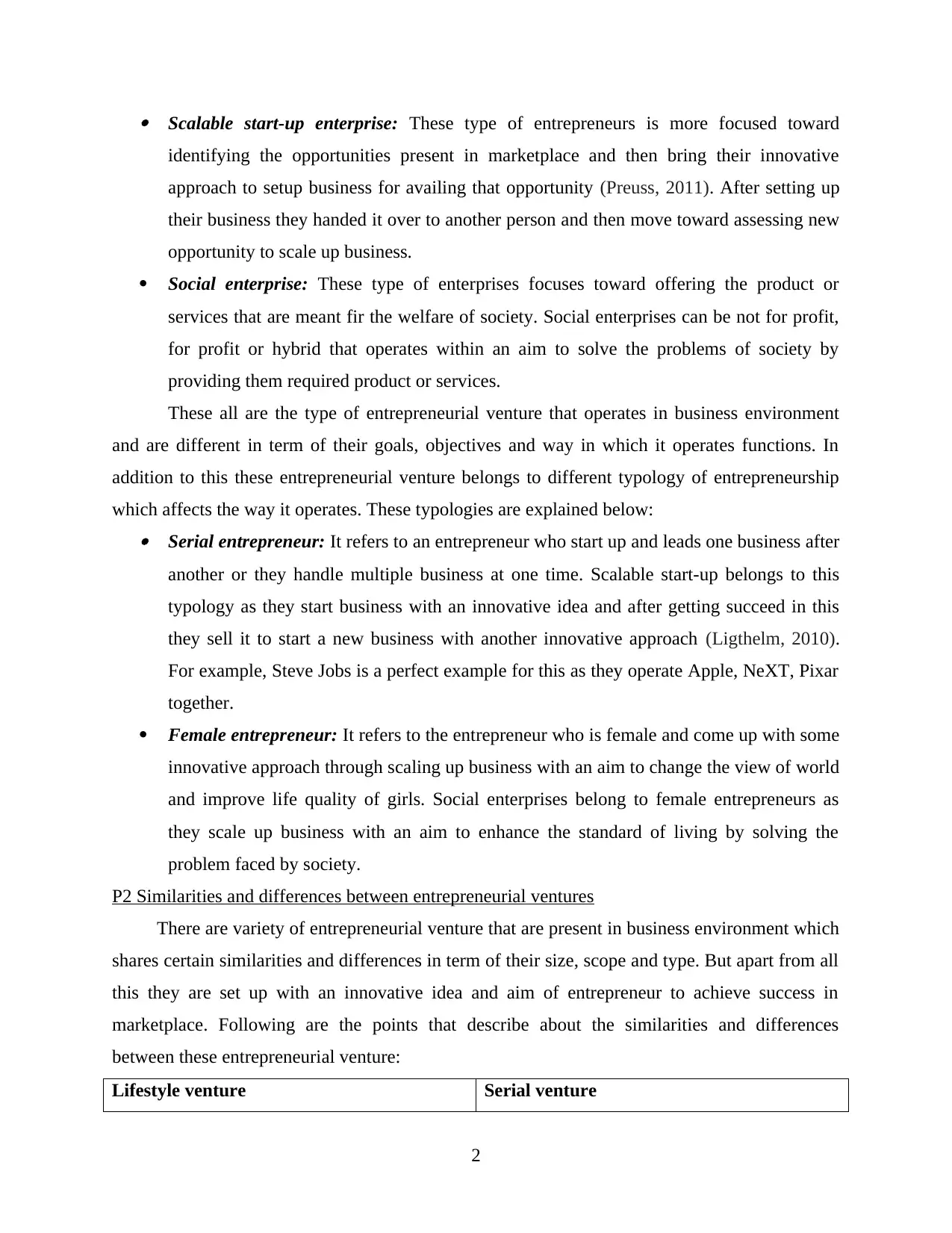
Scalable start-up enterprise: These type of entrepreneurs is more focused toward
identifying the opportunities present in marketplace and then bring their innovative
approach to setup business for availing that opportunity (Preuss, 2011). After setting up
their business they handed it over to another person and then move toward assessing new
opportunity to scale up business.
Social enterprise: These type of enterprises focuses toward offering the product or
services that are meant fir the welfare of society. Social enterprises can be not for profit,
for profit or hybrid that operates within an aim to solve the problems of society by
providing them required product or services.
These all are the type of entrepreneurial venture that operates in business environment
and are different in term of their goals, objectives and way in which it operates functions. In
addition to this these entrepreneurial venture belongs to different typology of entrepreneurship
which affects the way it operates. These typologies are explained below: Serial entrepreneur: It refers to an entrepreneur who start up and leads one business after
another or they handle multiple business at one time. Scalable start-up belongs to this
typology as they start business with an innovative idea and after getting succeed in this
they sell it to start a new business with another innovative approach (Ligthelm, 2010).
For example, Steve Jobs is a perfect example for this as they operate Apple, NeXT, Pixar
together.
Female entrepreneur: It refers to the entrepreneur who is female and come up with some
innovative approach through scaling up business with an aim to change the view of world
and improve life quality of girls. Social enterprises belong to female entrepreneurs as
they scale up business with an aim to enhance the standard of living by solving the
problem faced by society.
P2 Similarities and differences between entrepreneurial ventures
There are variety of entrepreneurial venture that are present in business environment which
shares certain similarities and differences in term of their size, scope and type. But apart from all
this they are set up with an innovative idea and aim of entrepreneur to achieve success in
marketplace. Following are the points that describe about the similarities and differences
between these entrepreneurial venture:
Lifestyle venture Serial venture
2
identifying the opportunities present in marketplace and then bring their innovative
approach to setup business for availing that opportunity (Preuss, 2011). After setting up
their business they handed it over to another person and then move toward assessing new
opportunity to scale up business.
Social enterprise: These type of enterprises focuses toward offering the product or
services that are meant fir the welfare of society. Social enterprises can be not for profit,
for profit or hybrid that operates within an aim to solve the problems of society by
providing them required product or services.
These all are the type of entrepreneurial venture that operates in business environment
and are different in term of their goals, objectives and way in which it operates functions. In
addition to this these entrepreneurial venture belongs to different typology of entrepreneurship
which affects the way it operates. These typologies are explained below: Serial entrepreneur: It refers to an entrepreneur who start up and leads one business after
another or they handle multiple business at one time. Scalable start-up belongs to this
typology as they start business with an innovative idea and after getting succeed in this
they sell it to start a new business with another innovative approach (Ligthelm, 2010).
For example, Steve Jobs is a perfect example for this as they operate Apple, NeXT, Pixar
together.
Female entrepreneur: It refers to the entrepreneur who is female and come up with some
innovative approach through scaling up business with an aim to change the view of world
and improve life quality of girls. Social enterprises belong to female entrepreneurs as
they scale up business with an aim to enhance the standard of living by solving the
problem faced by society.
P2 Similarities and differences between entrepreneurial ventures
There are variety of entrepreneurial venture that are present in business environment which
shares certain similarities and differences in term of their size, scope and type. But apart from all
this they are set up with an innovative idea and aim of entrepreneur to achieve success in
marketplace. Following are the points that describe about the similarities and differences
between these entrepreneurial venture:
Lifestyle venture Serial venture
2
Paraphrase This Document
Need a fresh take? Get an instant paraphrase of this document with our AI Paraphraser
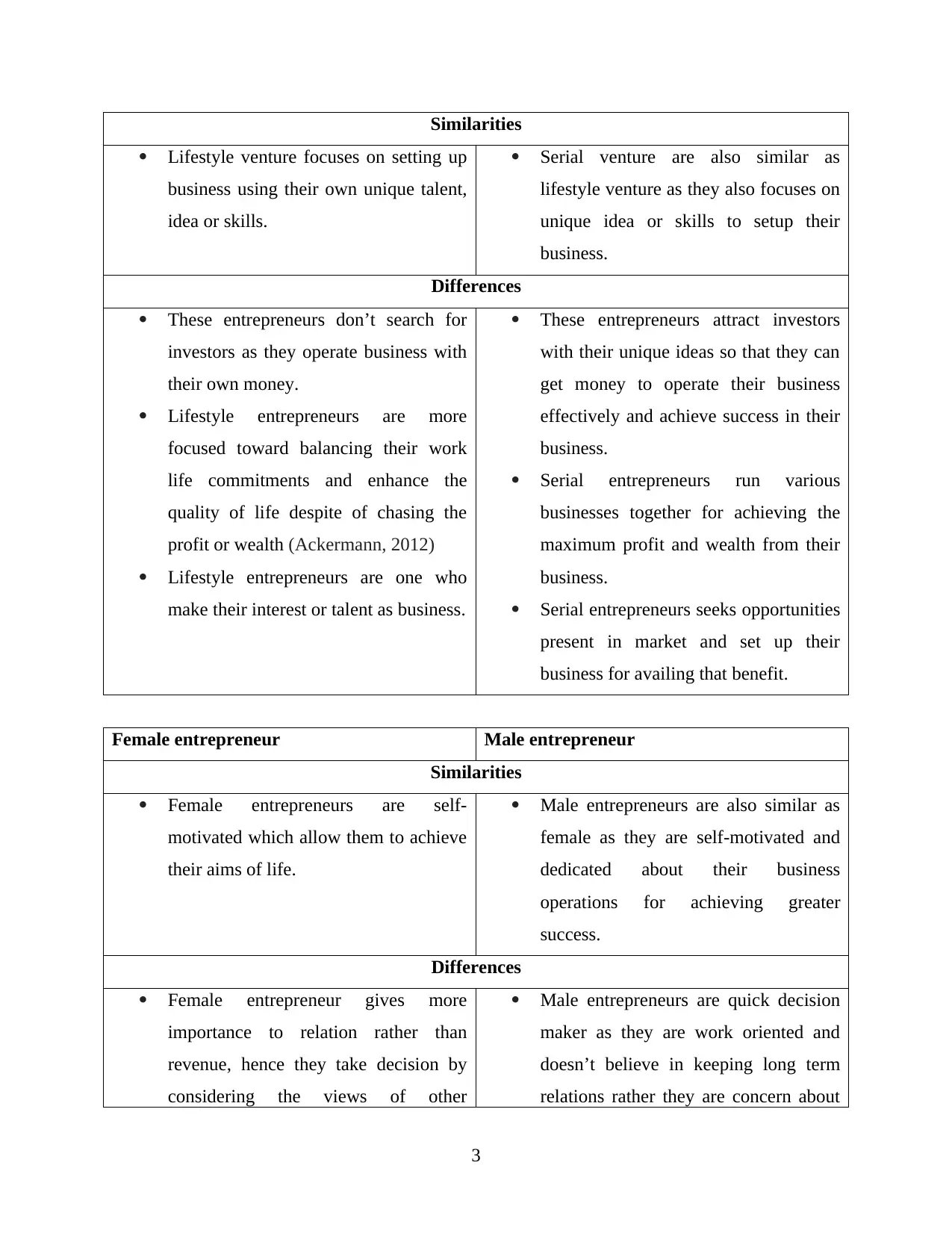
Similarities
Lifestyle venture focuses on setting up
business using their own unique talent,
idea or skills.
Serial venture are also similar as
lifestyle venture as they also focuses on
unique idea or skills to setup their
business.
Differences
These entrepreneurs don’t search for
investors as they operate business with
their own money.
Lifestyle entrepreneurs are more
focused toward balancing their work
life commitments and enhance the
quality of life despite of chasing the
profit or wealth (Ackermann, 2012)
Lifestyle entrepreneurs are one who
make their interest or talent as business.
These entrepreneurs attract investors
with their unique ideas so that they can
get money to operate their business
effectively and achieve success in their
business.
Serial entrepreneurs run various
businesses together for achieving the
maximum profit and wealth from their
business.
Serial entrepreneurs seeks opportunities
present in market and set up their
business for availing that benefit.
Female entrepreneur Male entrepreneur
Similarities
Female entrepreneurs are self-
motivated which allow them to achieve
their aims of life.
Male entrepreneurs are also similar as
female as they are self-motivated and
dedicated about their business
operations for achieving greater
success.
Differences
Female entrepreneur gives more
importance to relation rather than
revenue, hence they take decision by
considering the views of other
Male entrepreneurs are quick decision
maker as they are work oriented and
doesn’t believe in keeping long term
relations rather they are concern about
3
Lifestyle venture focuses on setting up
business using their own unique talent,
idea or skills.
Serial venture are also similar as
lifestyle venture as they also focuses on
unique idea or skills to setup their
business.
Differences
These entrepreneurs don’t search for
investors as they operate business with
their own money.
Lifestyle entrepreneurs are more
focused toward balancing their work
life commitments and enhance the
quality of life despite of chasing the
profit or wealth (Ackermann, 2012)
Lifestyle entrepreneurs are one who
make their interest or talent as business.
These entrepreneurs attract investors
with their unique ideas so that they can
get money to operate their business
effectively and achieve success in their
business.
Serial entrepreneurs run various
businesses together for achieving the
maximum profit and wealth from their
business.
Serial entrepreneurs seeks opportunities
present in market and set up their
business for availing that benefit.
Female entrepreneur Male entrepreneur
Similarities
Female entrepreneurs are self-
motivated which allow them to achieve
their aims of life.
Male entrepreneurs are also similar as
female as they are self-motivated and
dedicated about their business
operations for achieving greater
success.
Differences
Female entrepreneur gives more
importance to relation rather than
revenue, hence they take decision by
considering the views of other
Male entrepreneurs are quick decision
maker as they are work oriented and
doesn’t believe in keeping long term
relations rather they are concern about
3
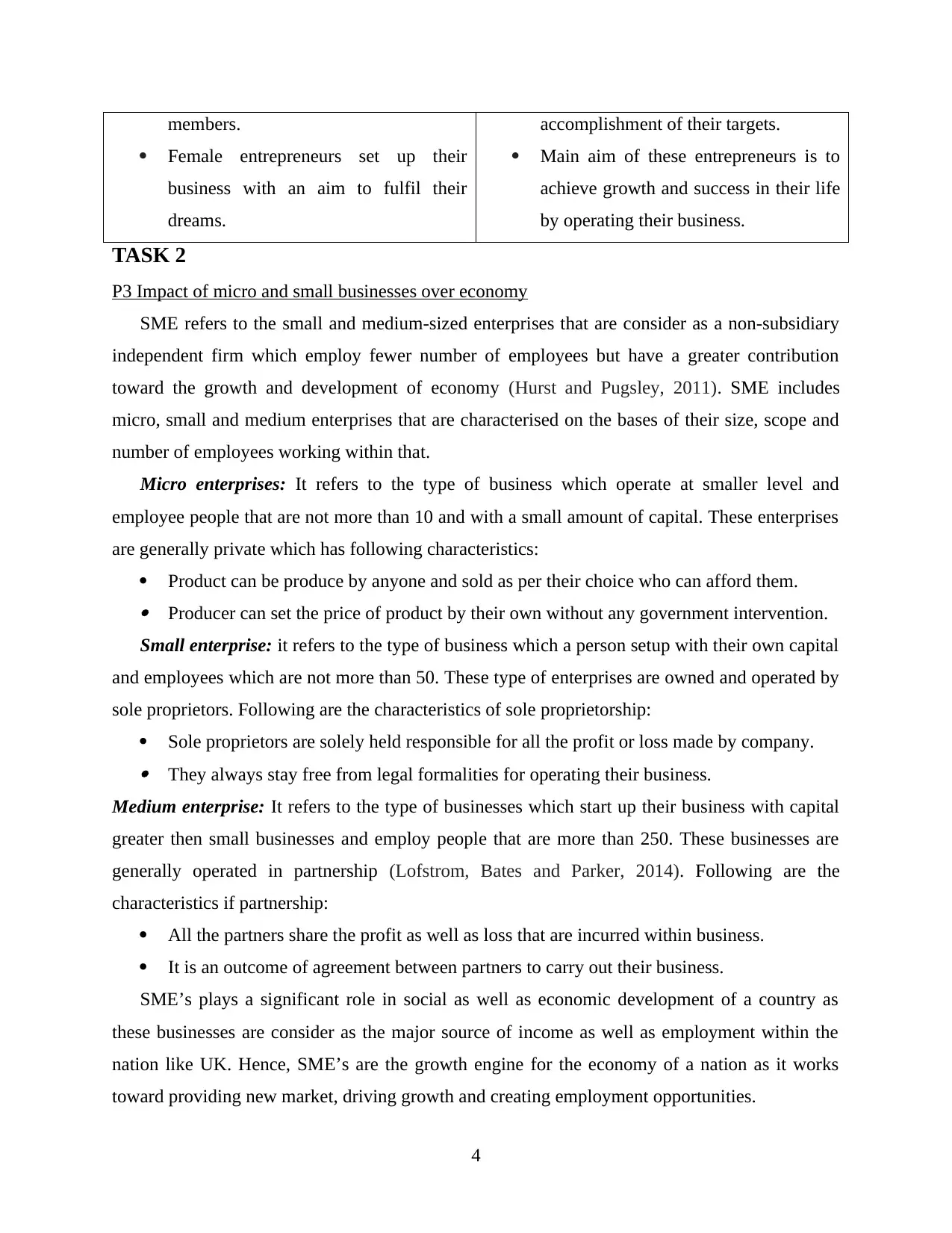
members.
Female entrepreneurs set up their
business with an aim to fulfil their
dreams.
accomplishment of their targets.
Main aim of these entrepreneurs is to
achieve growth and success in their life
by operating their business.
TASK 2
P3 Impact of micro and small businesses over economy
SME refers to the small and medium-sized enterprises that are consider as a non-subsidiary
independent firm which employ fewer number of employees but have a greater contribution
toward the growth and development of economy (Hurst and Pugsley, 2011). SME includes
micro, small and medium enterprises that are characterised on the bases of their size, scope and
number of employees working within that.
Micro enterprises: It refers to the type of business which operate at smaller level and
employee people that are not more than 10 and with a small amount of capital. These enterprises
are generally private which has following characteristics:
Product can be produce by anyone and sold as per their choice who can afford them. Producer can set the price of product by their own without any government intervention.
Small enterprise: it refers to the type of business which a person setup with their own capital
and employees which are not more than 50. These type of enterprises are owned and operated by
sole proprietors. Following are the characteristics of sole proprietorship:
Sole proprietors are solely held responsible for all the profit or loss made by company. They always stay free from legal formalities for operating their business.
Medium enterprise: It refers to the type of businesses which start up their business with capital
greater then small businesses and employ people that are more than 250. These businesses are
generally operated in partnership (Lofstrom, Bates and Parker, 2014). Following are the
characteristics if partnership:
All the partners share the profit as well as loss that are incurred within business.
It is an outcome of agreement between partners to carry out their business.
SME’s plays a significant role in social as well as economic development of a country as
these businesses are consider as the major source of income as well as employment within the
nation like UK. Hence, SME’s are the growth engine for the economy of a nation as it works
toward providing new market, driving growth and creating employment opportunities.
4
Female entrepreneurs set up their
business with an aim to fulfil their
dreams.
accomplishment of their targets.
Main aim of these entrepreneurs is to
achieve growth and success in their life
by operating their business.
TASK 2
P3 Impact of micro and small businesses over economy
SME refers to the small and medium-sized enterprises that are consider as a non-subsidiary
independent firm which employ fewer number of employees but have a greater contribution
toward the growth and development of economy (Hurst and Pugsley, 2011). SME includes
micro, small and medium enterprises that are characterised on the bases of their size, scope and
number of employees working within that.
Micro enterprises: It refers to the type of business which operate at smaller level and
employee people that are not more than 10 and with a small amount of capital. These enterprises
are generally private which has following characteristics:
Product can be produce by anyone and sold as per their choice who can afford them. Producer can set the price of product by their own without any government intervention.
Small enterprise: it refers to the type of business which a person setup with their own capital
and employees which are not more than 50. These type of enterprises are owned and operated by
sole proprietors. Following are the characteristics of sole proprietorship:
Sole proprietors are solely held responsible for all the profit or loss made by company. They always stay free from legal formalities for operating their business.
Medium enterprise: It refers to the type of businesses which start up their business with capital
greater then small businesses and employ people that are more than 250. These businesses are
generally operated in partnership (Lofstrom, Bates and Parker, 2014). Following are the
characteristics if partnership:
All the partners share the profit as well as loss that are incurred within business.
It is an outcome of agreement between partners to carry out their business.
SME’s plays a significant role in social as well as economic development of a country as
these businesses are consider as the major source of income as well as employment within the
nation like UK. Hence, SME’s are the growth engine for the economy of a nation as it works
toward providing new market, driving growth and creating employment opportunities.
4
⊘ This is a preview!⊘
Do you want full access?
Subscribe today to unlock all pages.

Trusted by 1+ million students worldwide
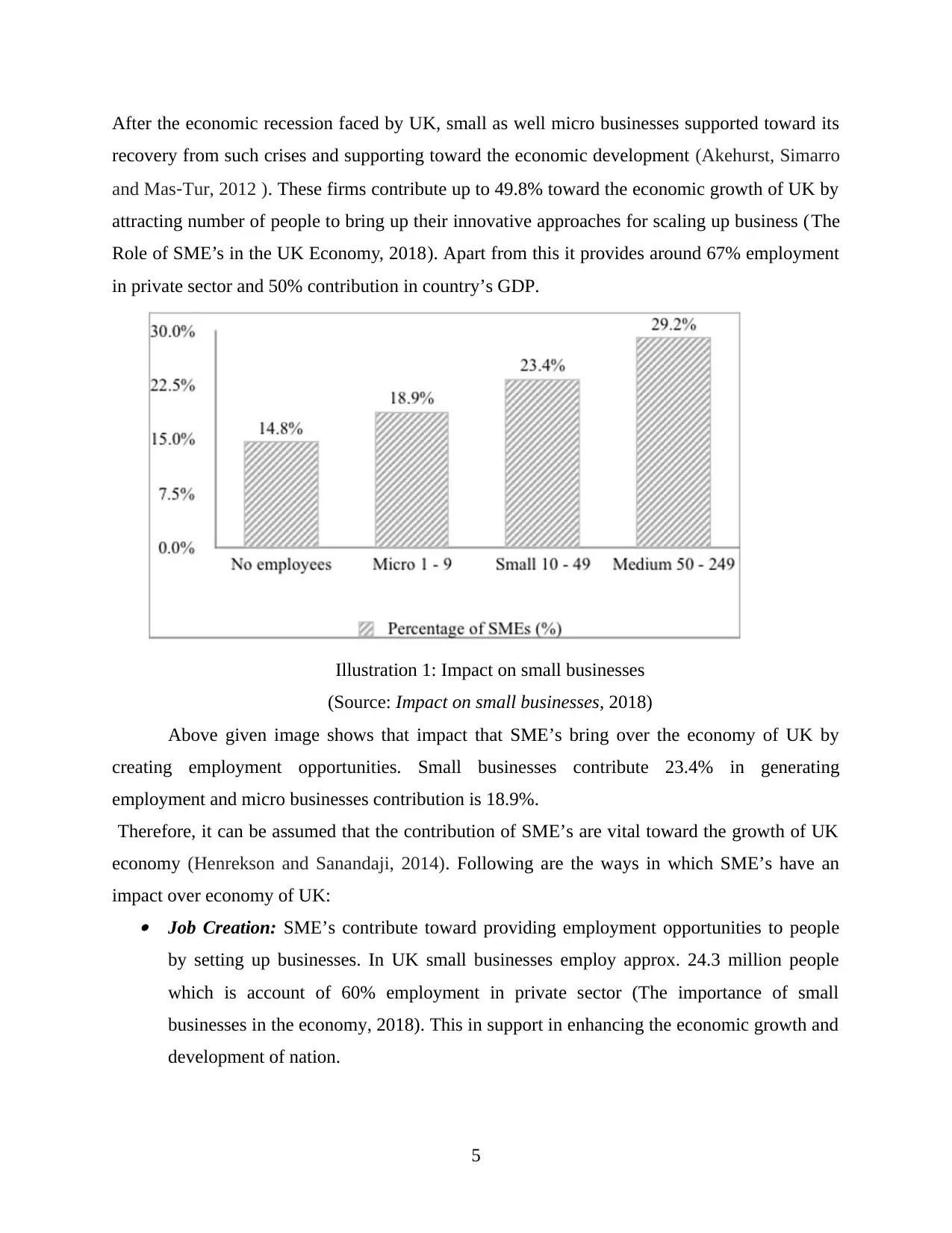
After the economic recession faced by UK, small as well micro businesses supported toward its
recovery from such crises and supporting toward the economic development (Akehurst, Simarro
and Mas‐Tur, 2012 ). These firms contribute up to 49.8% toward the economic growth of UK by
attracting number of people to bring up their innovative approaches for scaling up business (The
Role of SME’s in the UK Economy, 2018). Apart from this it provides around 67% employment
in private sector and 50% contribution in country’s GDP.
Illustration 1: Impact on small businesses
(Source: Impact on small businesses, 2018)
Above given image shows that impact that SME’s bring over the economy of UK by
creating employment opportunities. Small businesses contribute 23.4% in generating
employment and micro businesses contribution is 18.9%.
Therefore, it can be assumed that the contribution of SME’s are vital toward the growth of UK
economy (Henrekson and Sanandaji, 2014). Following are the ways in which SME’s have an
impact over economy of UK: Job Creation: SME’s contribute toward providing employment opportunities to people
by setting up businesses. In UK small businesses employ approx. 24.3 million people
which is account of 60% employment in private sector (The importance of small
businesses in the economy, 2018). This in support in enhancing the economic growth and
development of nation.
5
recovery from such crises and supporting toward the economic development (Akehurst, Simarro
and Mas‐Tur, 2012 ). These firms contribute up to 49.8% toward the economic growth of UK by
attracting number of people to bring up their innovative approaches for scaling up business (The
Role of SME’s in the UK Economy, 2018). Apart from this it provides around 67% employment
in private sector and 50% contribution in country’s GDP.
Illustration 1: Impact on small businesses
(Source: Impact on small businesses, 2018)
Above given image shows that impact that SME’s bring over the economy of UK by
creating employment opportunities. Small businesses contribute 23.4% in generating
employment and micro businesses contribution is 18.9%.
Therefore, it can be assumed that the contribution of SME’s are vital toward the growth of UK
economy (Henrekson and Sanandaji, 2014). Following are the ways in which SME’s have an
impact over economy of UK: Job Creation: SME’s contribute toward providing employment opportunities to people
by setting up businesses. In UK small businesses employ approx. 24.3 million people
which is account of 60% employment in private sector (The importance of small
businesses in the economy, 2018). This in support in enhancing the economic growth and
development of nation.
5
Paraphrase This Document
Need a fresh take? Get an instant paraphrase of this document with our AI Paraphraser
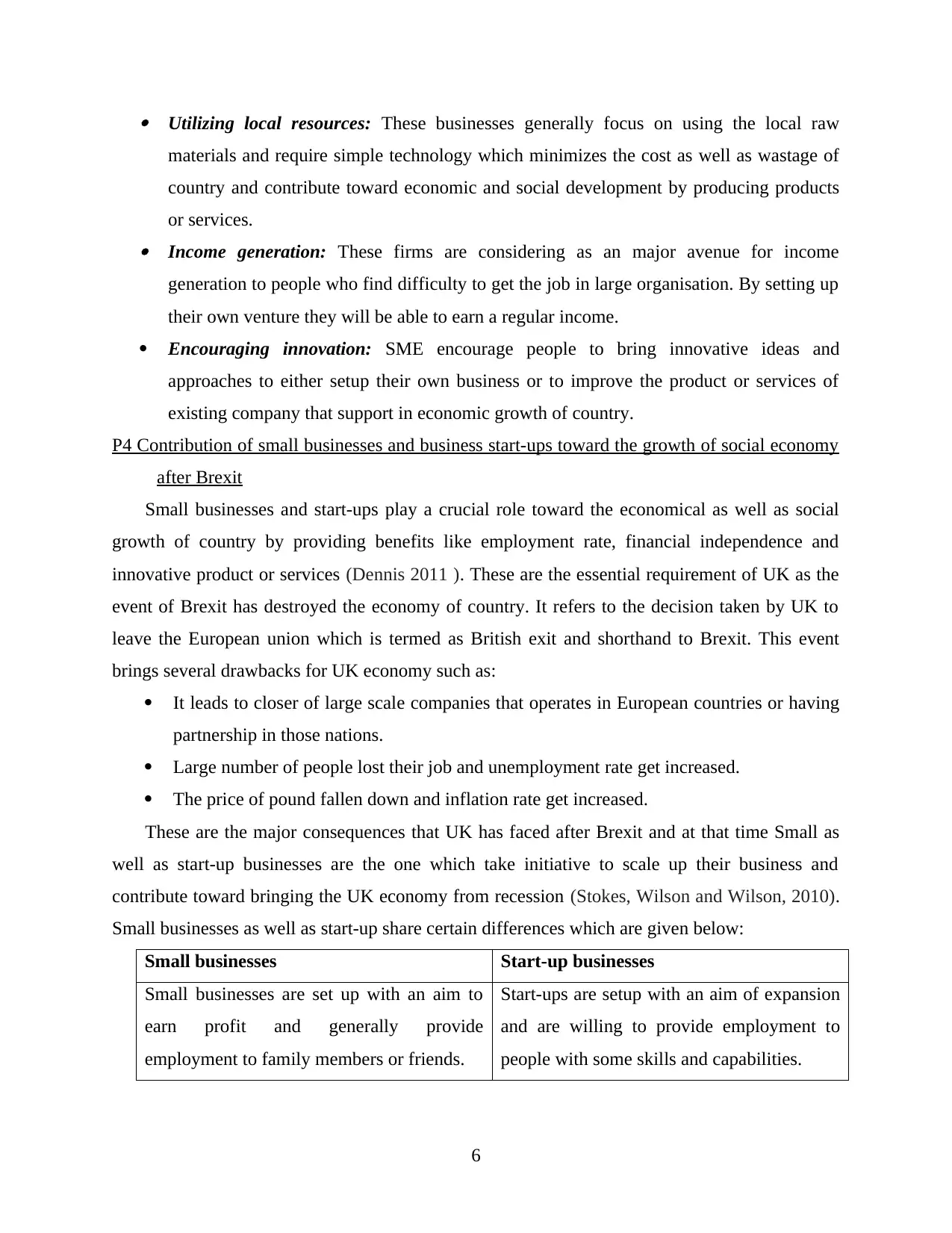
Utilizing local resources: These businesses generally focus on using the local raw
materials and require simple technology which minimizes the cost as well as wastage of
country and contribute toward economic and social development by producing products
or services. Income generation: These firms are considering as an major avenue for income
generation to people who find difficulty to get the job in large organisation. By setting up
their own venture they will be able to earn a regular income.
Encouraging innovation: SME encourage people to bring innovative ideas and
approaches to either setup their own business or to improve the product or services of
existing company that support in economic growth of country.
P4 Contribution of small businesses and business start-ups toward the growth of social economy
after Brexit
Small businesses and start-ups play a crucial role toward the economical as well as social
growth of country by providing benefits like employment rate, financial independence and
innovative product or services (Dennis 2011 ). These are the essential requirement of UK as the
event of Brexit has destroyed the economy of country. It refers to the decision taken by UK to
leave the European union which is termed as British exit and shorthand to Brexit. This event
brings several drawbacks for UK economy such as:
It leads to closer of large scale companies that operates in European countries or having
partnership in those nations.
Large number of people lost their job and unemployment rate get increased.
The price of pound fallen down and inflation rate get increased.
These are the major consequences that UK has faced after Brexit and at that time Small as
well as start-up businesses are the one which take initiative to scale up their business and
contribute toward bringing the UK economy from recession (Stokes, Wilson and Wilson, 2010).
Small businesses as well as start-up share certain differences which are given below:
Small businesses Start-up businesses
Small businesses are set up with an aim to
earn profit and generally provide
employment to family members or friends.
Start-ups are setup with an aim of expansion
and are willing to provide employment to
people with some skills and capabilities.
6
materials and require simple technology which minimizes the cost as well as wastage of
country and contribute toward economic and social development by producing products
or services. Income generation: These firms are considering as an major avenue for income
generation to people who find difficulty to get the job in large organisation. By setting up
their own venture they will be able to earn a regular income.
Encouraging innovation: SME encourage people to bring innovative ideas and
approaches to either setup their own business or to improve the product or services of
existing company that support in economic growth of country.
P4 Contribution of small businesses and business start-ups toward the growth of social economy
after Brexit
Small businesses and start-ups play a crucial role toward the economical as well as social
growth of country by providing benefits like employment rate, financial independence and
innovative product or services (Dennis 2011 ). These are the essential requirement of UK as the
event of Brexit has destroyed the economy of country. It refers to the decision taken by UK to
leave the European union which is termed as British exit and shorthand to Brexit. This event
brings several drawbacks for UK economy such as:
It leads to closer of large scale companies that operates in European countries or having
partnership in those nations.
Large number of people lost their job and unemployment rate get increased.
The price of pound fallen down and inflation rate get increased.
These are the major consequences that UK has faced after Brexit and at that time Small as
well as start-up businesses are the one which take initiative to scale up their business and
contribute toward bringing the UK economy from recession (Stokes, Wilson and Wilson, 2010).
Small businesses as well as start-up share certain differences which are given below:
Small businesses Start-up businesses
Small businesses are set up with an aim to
earn profit and generally provide
employment to family members or friends.
Start-ups are setup with an aim of expansion
and are willing to provide employment to
people with some skills and capabilities.
6
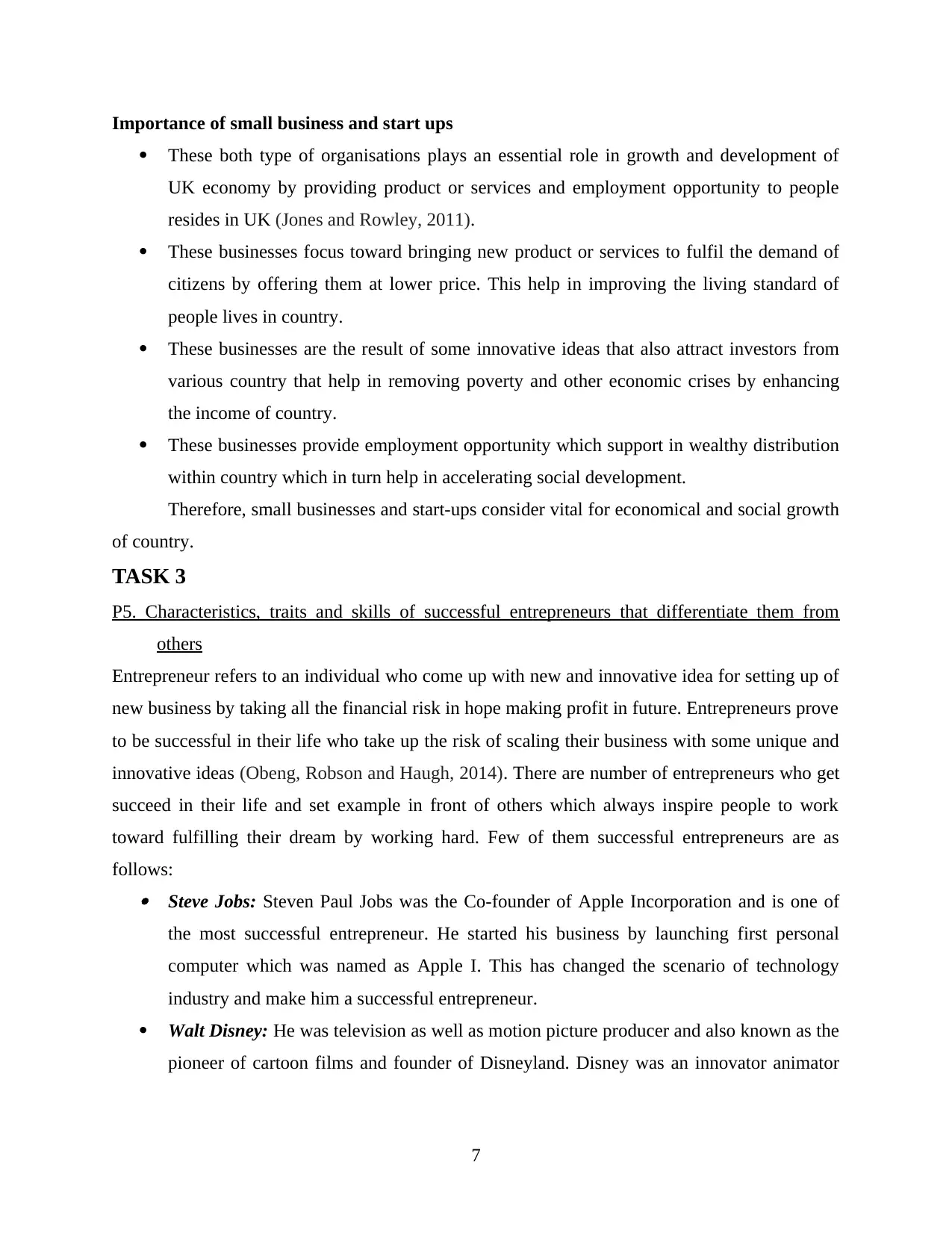
Importance of small business and start ups
These both type of organisations plays an essential role in growth and development of
UK economy by providing product or services and employment opportunity to people
resides in UK (Jones and Rowley, 2011).
These businesses focus toward bringing new product or services to fulfil the demand of
citizens by offering them at lower price. This help in improving the living standard of
people lives in country.
These businesses are the result of some innovative ideas that also attract investors from
various country that help in removing poverty and other economic crises by enhancing
the income of country.
These businesses provide employment opportunity which support in wealthy distribution
within country which in turn help in accelerating social development.
Therefore, small businesses and start-ups consider vital for economical and social growth
of country.
TASK 3
P5. Characteristics, traits and skills of successful entrepreneurs that differentiate them from
others
Entrepreneur refers to an individual who come up with new and innovative idea for setting up of
new business by taking all the financial risk in hope making profit in future. Entrepreneurs prove
to be successful in their life who take up the risk of scaling their business with some unique and
innovative ideas (Obeng, Robson and Haugh, 2014). There are number of entrepreneurs who get
succeed in their life and set example in front of others which always inspire people to work
toward fulfilling their dream by working hard. Few of them successful entrepreneurs are as
follows: Steve Jobs: Steven Paul Jobs was the Co-founder of Apple Incorporation and is one of
the most successful entrepreneur. He started his business by launching first personal
computer which was named as Apple I. This has changed the scenario of technology
industry and make him a successful entrepreneur.
Walt Disney: He was television as well as motion picture producer and also known as the
pioneer of cartoon films and founder of Disneyland. Disney was an innovator animator
7
These both type of organisations plays an essential role in growth and development of
UK economy by providing product or services and employment opportunity to people
resides in UK (Jones and Rowley, 2011).
These businesses focus toward bringing new product or services to fulfil the demand of
citizens by offering them at lower price. This help in improving the living standard of
people lives in country.
These businesses are the result of some innovative ideas that also attract investors from
various country that help in removing poverty and other economic crises by enhancing
the income of country.
These businesses provide employment opportunity which support in wealthy distribution
within country which in turn help in accelerating social development.
Therefore, small businesses and start-ups consider vital for economical and social growth
of country.
TASK 3
P5. Characteristics, traits and skills of successful entrepreneurs that differentiate them from
others
Entrepreneur refers to an individual who come up with new and innovative idea for setting up of
new business by taking all the financial risk in hope making profit in future. Entrepreneurs prove
to be successful in their life who take up the risk of scaling their business with some unique and
innovative ideas (Obeng, Robson and Haugh, 2014). There are number of entrepreneurs who get
succeed in their life and set example in front of others which always inspire people to work
toward fulfilling their dream by working hard. Few of them successful entrepreneurs are as
follows: Steve Jobs: Steven Paul Jobs was the Co-founder of Apple Incorporation and is one of
the most successful entrepreneur. He started his business by launching first personal
computer which was named as Apple I. This has changed the scenario of technology
industry and make him a successful entrepreneur.
Walt Disney: He was television as well as motion picture producer and also known as the
pioneer of cartoon films and founder of Disneyland. Disney was an innovator animator
7
⊘ This is a preview!⊘
Do you want full access?
Subscribe today to unlock all pages.

Trusted by 1+ million students worldwide
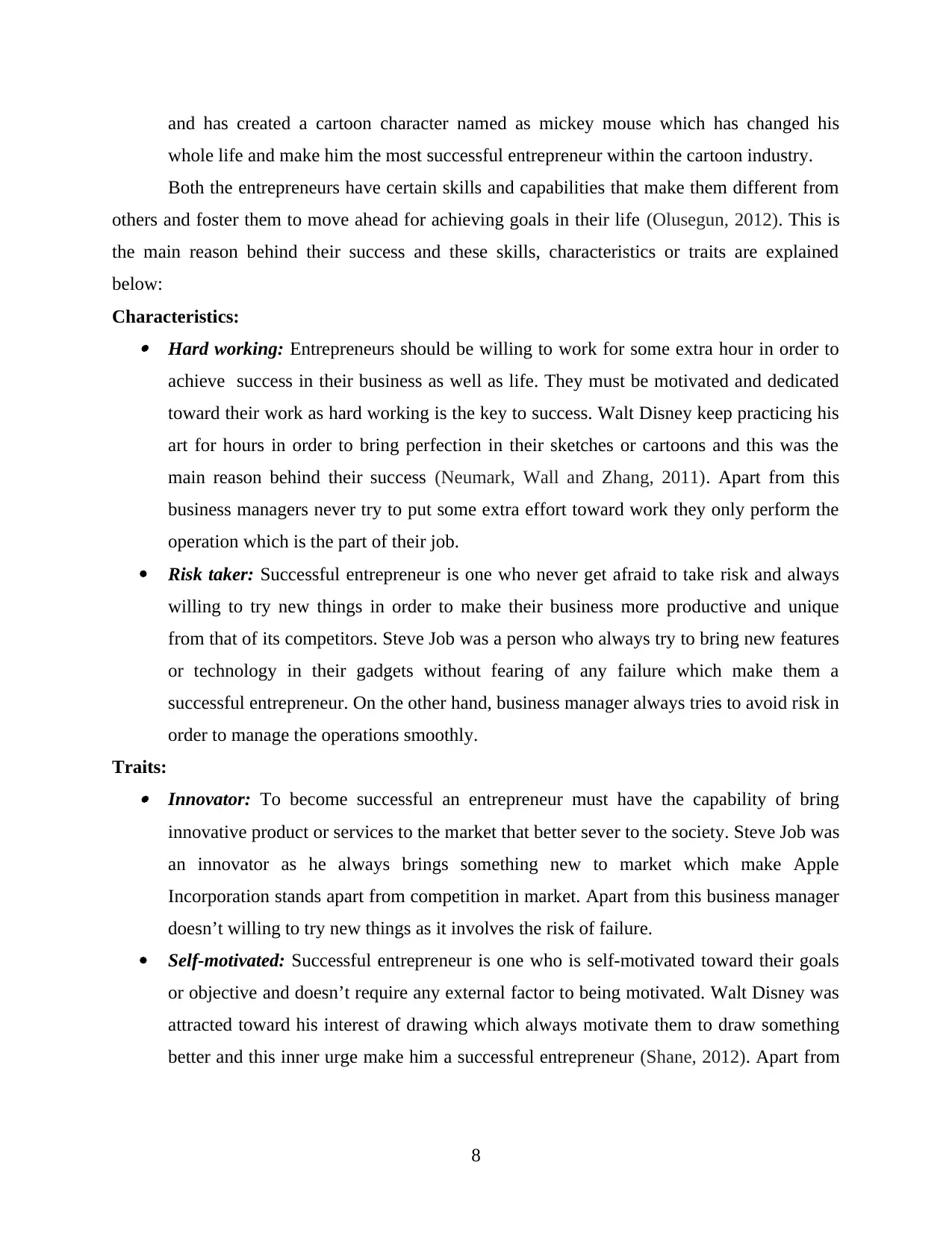
and has created a cartoon character named as mickey mouse which has changed his
whole life and make him the most successful entrepreneur within the cartoon industry.
Both the entrepreneurs have certain skills and capabilities that make them different from
others and foster them to move ahead for achieving goals in their life (Olusegun, 2012). This is
the main reason behind their success and these skills, characteristics or traits are explained
below:
Characteristics: Hard working: Entrepreneurs should be willing to work for some extra hour in order to
achieve success in their business as well as life. They must be motivated and dedicated
toward their work as hard working is the key to success. Walt Disney keep practicing his
art for hours in order to bring perfection in their sketches or cartoons and this was the
main reason behind their success (Neumark, Wall and Zhang, 2011). Apart from this
business managers never try to put some extra effort toward work they only perform the
operation which is the part of their job.
Risk taker: Successful entrepreneur is one who never get afraid to take risk and always
willing to try new things in order to make their business more productive and unique
from that of its competitors. Steve Job was a person who always try to bring new features
or technology in their gadgets without fearing of any failure which make them a
successful entrepreneur. On the other hand, business manager always tries to avoid risk in
order to manage the operations smoothly.
Traits: Innovator: To become successful an entrepreneur must have the capability of bring
innovative product or services to the market that better sever to the society. Steve Job was
an innovator as he always brings something new to market which make Apple
Incorporation stands apart from competition in market. Apart from this business manager
doesn’t willing to try new things as it involves the risk of failure.
Self-motivated: Successful entrepreneur is one who is self-motivated toward their goals
or objective and doesn’t require any external factor to being motivated. Walt Disney was
attracted toward his interest of drawing which always motivate them to draw something
better and this inner urge make him a successful entrepreneur (Shane, 2012). Apart from
8
whole life and make him the most successful entrepreneur within the cartoon industry.
Both the entrepreneurs have certain skills and capabilities that make them different from
others and foster them to move ahead for achieving goals in their life (Olusegun, 2012). This is
the main reason behind their success and these skills, characteristics or traits are explained
below:
Characteristics: Hard working: Entrepreneurs should be willing to work for some extra hour in order to
achieve success in their business as well as life. They must be motivated and dedicated
toward their work as hard working is the key to success. Walt Disney keep practicing his
art for hours in order to bring perfection in their sketches or cartoons and this was the
main reason behind their success (Neumark, Wall and Zhang, 2011). Apart from this
business managers never try to put some extra effort toward work they only perform the
operation which is the part of their job.
Risk taker: Successful entrepreneur is one who never get afraid to take risk and always
willing to try new things in order to make their business more productive and unique
from that of its competitors. Steve Job was a person who always try to bring new features
or technology in their gadgets without fearing of any failure which make them a
successful entrepreneur. On the other hand, business manager always tries to avoid risk in
order to manage the operations smoothly.
Traits: Innovator: To become successful an entrepreneur must have the capability of bring
innovative product or services to the market that better sever to the society. Steve Job was
an innovator as he always brings something new to market which make Apple
Incorporation stands apart from competition in market. Apart from this business manager
doesn’t willing to try new things as it involves the risk of failure.
Self-motivated: Successful entrepreneur is one who is self-motivated toward their goals
or objective and doesn’t require any external factor to being motivated. Walt Disney was
attracted toward his interest of drawing which always motivate them to draw something
better and this inner urge make him a successful entrepreneur (Shane, 2012). Apart from
8
Paraphrase This Document
Need a fresh take? Get an instant paraphrase of this document with our AI Paraphraser
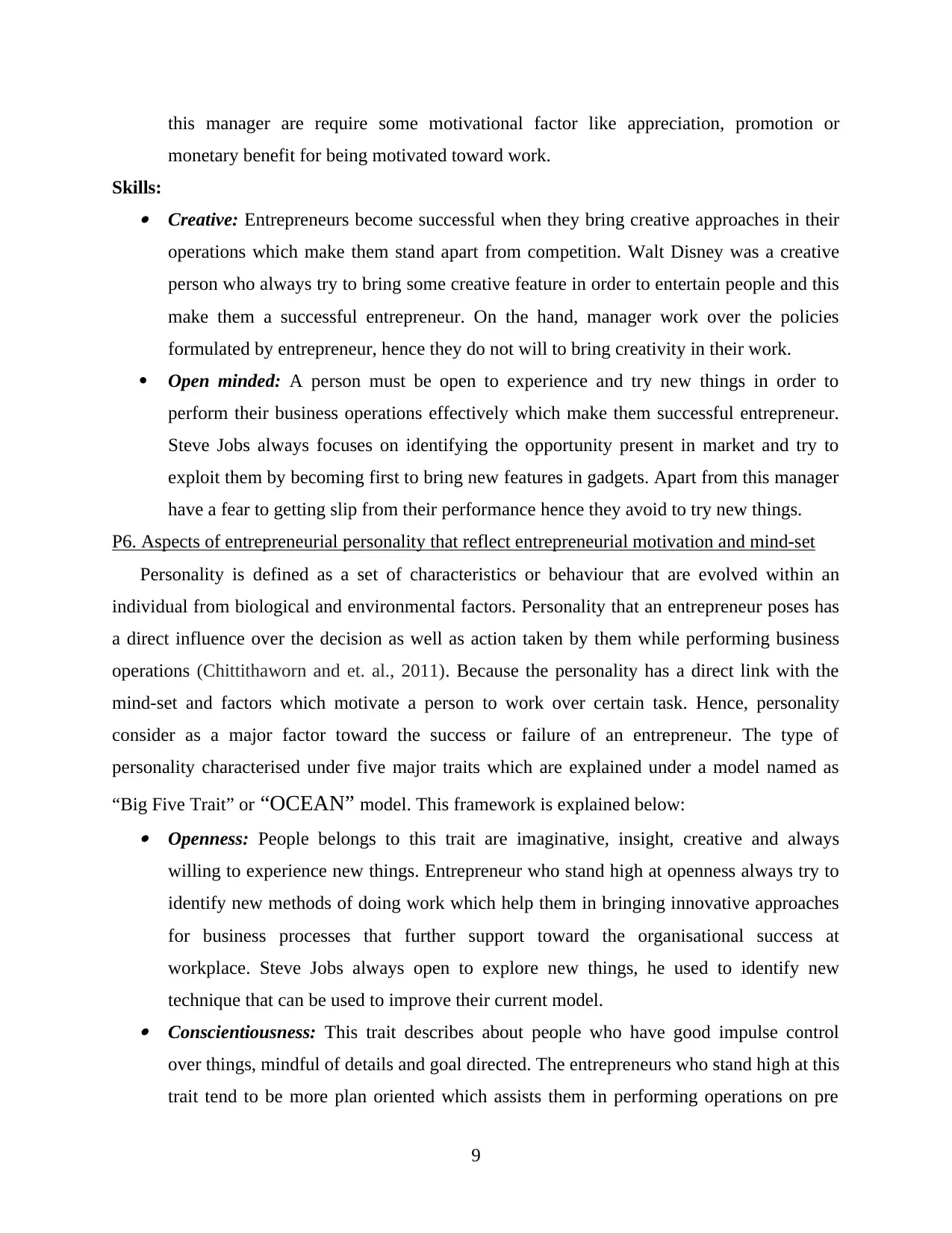
this manager are require some motivational factor like appreciation, promotion or
monetary benefit for being motivated toward work.
Skills: Creative: Entrepreneurs become successful when they bring creative approaches in their
operations which make them stand apart from competition. Walt Disney was a creative
person who always try to bring some creative feature in order to entertain people and this
make them a successful entrepreneur. On the hand, manager work over the policies
formulated by entrepreneur, hence they do not will to bring creativity in their work.
Open minded: A person must be open to experience and try new things in order to
perform their business operations effectively which make them successful entrepreneur.
Steve Jobs always focuses on identifying the opportunity present in market and try to
exploit them by becoming first to bring new features in gadgets. Apart from this manager
have a fear to getting slip from their performance hence they avoid to try new things.
P6. Aspects of entrepreneurial personality that reflect entrepreneurial motivation and mind-set
Personality is defined as a set of characteristics or behaviour that are evolved within an
individual from biological and environmental factors. Personality that an entrepreneur poses has
a direct influence over the decision as well as action taken by them while performing business
operations (Chittithaworn and et. al., 2011). Because the personality has a direct link with the
mind-set and factors which motivate a person to work over certain task. Hence, personality
consider as a major factor toward the success or failure of an entrepreneur. The type of
personality characterised under five major traits which are explained under a model named as
“Big Five Trait” or “OCEAN” model. This framework is explained below: Openness: People belongs to this trait are imaginative, insight, creative and always
willing to experience new things. Entrepreneur who stand high at openness always try to
identify new methods of doing work which help them in bringing innovative approaches
for business processes that further support toward the organisational success at
workplace. Steve Jobs always open to explore new things, he used to identify new
technique that can be used to improve their current model. Conscientiousness: This trait describes about people who have good impulse control
over things, mindful of details and goal directed. The entrepreneurs who stand high at this
trait tend to be more plan oriented which assists them in performing operations on pre
9
monetary benefit for being motivated toward work.
Skills: Creative: Entrepreneurs become successful when they bring creative approaches in their
operations which make them stand apart from competition. Walt Disney was a creative
person who always try to bring some creative feature in order to entertain people and this
make them a successful entrepreneur. On the hand, manager work over the policies
formulated by entrepreneur, hence they do not will to bring creativity in their work.
Open minded: A person must be open to experience and try new things in order to
perform their business operations effectively which make them successful entrepreneur.
Steve Jobs always focuses on identifying the opportunity present in market and try to
exploit them by becoming first to bring new features in gadgets. Apart from this manager
have a fear to getting slip from their performance hence they avoid to try new things.
P6. Aspects of entrepreneurial personality that reflect entrepreneurial motivation and mind-set
Personality is defined as a set of characteristics or behaviour that are evolved within an
individual from biological and environmental factors. Personality that an entrepreneur poses has
a direct influence over the decision as well as action taken by them while performing business
operations (Chittithaworn and et. al., 2011). Because the personality has a direct link with the
mind-set and factors which motivate a person to work over certain task. Hence, personality
consider as a major factor toward the success or failure of an entrepreneur. The type of
personality characterised under five major traits which are explained under a model named as
“Big Five Trait” or “OCEAN” model. This framework is explained below: Openness: People belongs to this trait are imaginative, insight, creative and always
willing to experience new things. Entrepreneur who stand high at openness always try to
identify new methods of doing work which help them in bringing innovative approaches
for business processes that further support toward the organisational success at
workplace. Steve Jobs always open to explore new things, he used to identify new
technique that can be used to improve their current model. Conscientiousness: This trait describes about people who have good impulse control
over things, mindful of details and goal directed. The entrepreneurs who stand high at this
trait tend to be more plan oriented which assists them in performing operations on pre
9
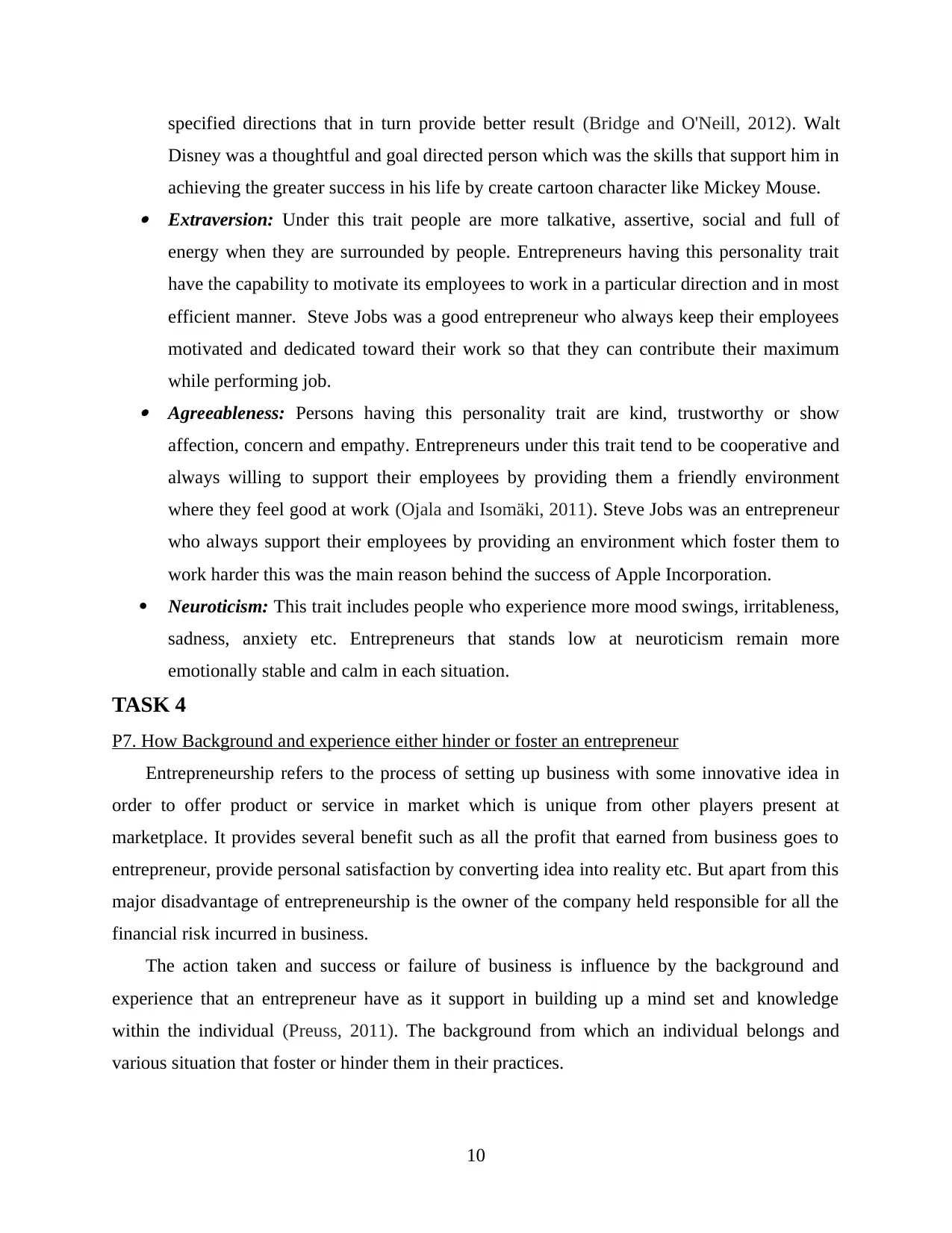
specified directions that in turn provide better result (Bridge and O'Neill, 2012). Walt
Disney was a thoughtful and goal directed person which was the skills that support him in
achieving the greater success in his life by create cartoon character like Mickey Mouse. Extraversion: Under this trait people are more talkative, assertive, social and full of
energy when they are surrounded by people. Entrepreneurs having this personality trait
have the capability to motivate its employees to work in a particular direction and in most
efficient manner. Steve Jobs was a good entrepreneur who always keep their employees
motivated and dedicated toward their work so that they can contribute their maximum
while performing job. Agreeableness: Persons having this personality trait are kind, trustworthy or show
affection, concern and empathy. Entrepreneurs under this trait tend to be cooperative and
always willing to support their employees by providing them a friendly environment
where they feel good at work (Ojala and Isomäki, 2011). Steve Jobs was an entrepreneur
who always support their employees by providing an environment which foster them to
work harder this was the main reason behind the success of Apple Incorporation.
Neuroticism: This trait includes people who experience more mood swings, irritableness,
sadness, anxiety etc. Entrepreneurs that stands low at neuroticism remain more
emotionally stable and calm in each situation.
TASK 4
P7. How Background and experience either hinder or foster an entrepreneur
Entrepreneurship refers to the process of setting up business with some innovative idea in
order to offer product or service in market which is unique from other players present at
marketplace. It provides several benefit such as all the profit that earned from business goes to
entrepreneur, provide personal satisfaction by converting idea into reality etc. But apart from this
major disadvantage of entrepreneurship is the owner of the company held responsible for all the
financial risk incurred in business.
The action taken and success or failure of business is influence by the background and
experience that an entrepreneur have as it support in building up a mind set and knowledge
within the individual (Preuss, 2011). The background from which an individual belongs and
various situation that foster or hinder them in their practices.
10
Disney was a thoughtful and goal directed person which was the skills that support him in
achieving the greater success in his life by create cartoon character like Mickey Mouse. Extraversion: Under this trait people are more talkative, assertive, social and full of
energy when they are surrounded by people. Entrepreneurs having this personality trait
have the capability to motivate its employees to work in a particular direction and in most
efficient manner. Steve Jobs was a good entrepreneur who always keep their employees
motivated and dedicated toward their work so that they can contribute their maximum
while performing job. Agreeableness: Persons having this personality trait are kind, trustworthy or show
affection, concern and empathy. Entrepreneurs under this trait tend to be cooperative and
always willing to support their employees by providing them a friendly environment
where they feel good at work (Ojala and Isomäki, 2011). Steve Jobs was an entrepreneur
who always support their employees by providing an environment which foster them to
work harder this was the main reason behind the success of Apple Incorporation.
Neuroticism: This trait includes people who experience more mood swings, irritableness,
sadness, anxiety etc. Entrepreneurs that stands low at neuroticism remain more
emotionally stable and calm in each situation.
TASK 4
P7. How Background and experience either hinder or foster an entrepreneur
Entrepreneurship refers to the process of setting up business with some innovative idea in
order to offer product or service in market which is unique from other players present at
marketplace. It provides several benefit such as all the profit that earned from business goes to
entrepreneur, provide personal satisfaction by converting idea into reality etc. But apart from this
major disadvantage of entrepreneurship is the owner of the company held responsible for all the
financial risk incurred in business.
The action taken and success or failure of business is influence by the background and
experience that an entrepreneur have as it support in building up a mind set and knowledge
within the individual (Preuss, 2011). The background from which an individual belongs and
various situation that foster or hinder them in their practices.
10
⊘ This is a preview!⊘
Do you want full access?
Subscribe today to unlock all pages.

Trusted by 1+ million students worldwide
1 out of 15
Related Documents
Your All-in-One AI-Powered Toolkit for Academic Success.
+13062052269
info@desklib.com
Available 24*7 on WhatsApp / Email
![[object Object]](/_next/static/media/star-bottom.7253800d.svg)
Unlock your academic potential
Copyright © 2020–2026 A2Z Services. All Rights Reserved. Developed and managed by ZUCOL.





